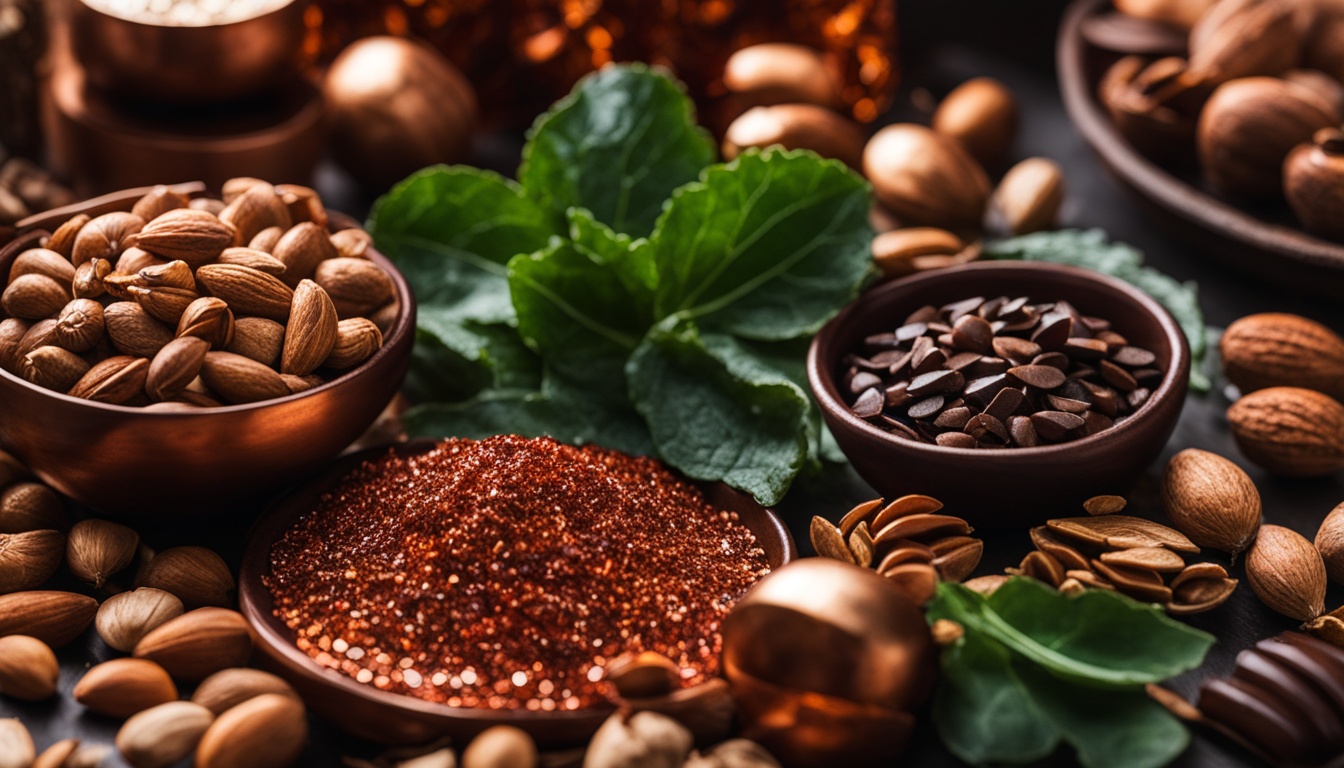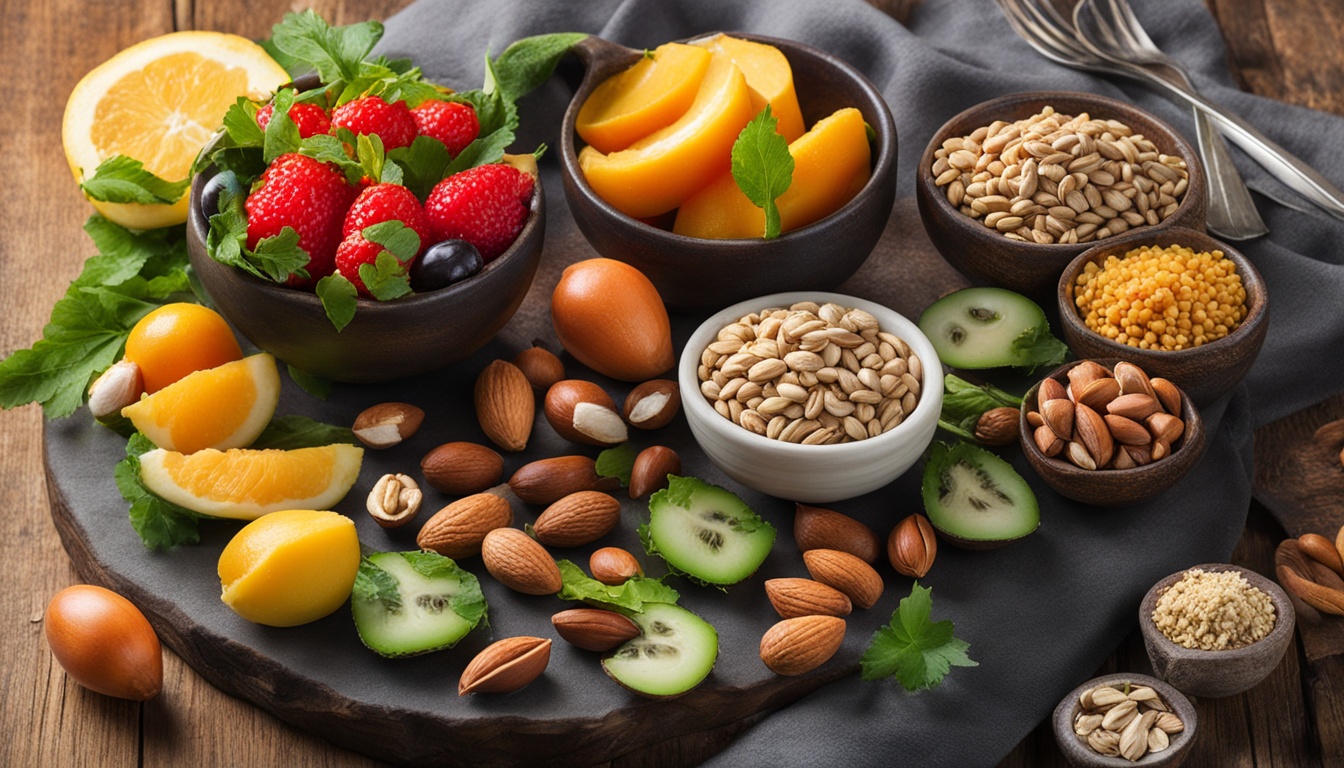The average diet gives men about 1,400 mcg of copper daily; women, about 1,100 mcg. Copper is vital for many body functions, including making energy and keeping the immune system strong. Several key enzymes require copper for their work, essential for a balanced diet.
Copper is found in certain foods and as supplements. It helps in blood vessel creation, balancing hormones in the brain, controlling how our genes work, growing the brain, coloring our skin, and boosting the immune system. Copper is also part of superoxide dismutases, which protect us from harmful molecules that can damage our bodies.
Most of the body’s copper is in the bones and muscles. A normal adult has 50-120 mg of this precious mineral inside them. The body keeps the right amount by carefully absorbing what it needs and getting rid of the extra in bile, a system that helps prevent too little or too much copper.
Copper is key for good health. By understanding how important dietary copper is, we can make better choices for our diets. This can have long-lasting benefits for our health.
Key Takeaways
- Copper is vital for many body functions, supporting energy, the immune system, and protecting against harmful molecules.
- The daily diet gives men about 1,400 mcg of copper and women about 1,100 mcg.
- Copper is mostly in our bones and muscles, with a typical person having 50–120 mg in total.
- Not getting enough copper can cause problems like anemia, weaker bones, and higher infection chances.
- Knowing how important copper is can guide us in making choices that support our health.
Introduction to Dietary Copper
Copper is a vital mineral found in certain foods or as a supplement. It acts alongside enzymes, including cuproenzymes. These enzymes help with energy making, iron use, and tissue building. An important cuproenzyme is ceruloplasmin (CP), which handles iron and carries over 95% of copper in human plasma.
Copper’s Role in the Body
Copper does a lot in the body. It helps form blood vessels, keeps hormones and genes in check, and aids in brain growth, skin color, and immune response. Copper is also a key player in fighting off cell damage with its superoxide dismutase enzymes.
Importance of Copper for Overall Health
Recommended Dietary Copper Intake
The Food and Nutrition Board (FNB) at the National Academies of Sciences sets copper intake standards. These standards are part of the Dietary Reference Intakes (DRIs). They help ensure nearly every healthy person gets enough nutrients.
Recommended Dietary Allowances (RDAs) for Copper
According to the FNB, infants need as little as 200 mcg of copper a day. But, adults should get up to 900 mcg every day. These levels are set to support the body with energy, help with iron, and keep the immune system strong.
Adequate Intake (AI) for Infants and Toddlers
If you’re a baby just born until one year old, aim for 200-220 mcg of copper each day. This amount is like what’s found in healthy, breastfed babies. It helps ensure you get enough copper for good health during this key time.
Dietary Sources of Copper
Great sources of copper are foods like shellfish, nuts, and whole grains. The body absorbs more copper from food when the amount eaten is lower. For example, you get about 75% of the copper in 400 mcg of food. But, this drops to only 12% from 7.5 mg.
Drinks like tap water can add copper to your diet too. The amount in water and beverages varies, from 0.0005 mg/L to 1 mg/L.
Copper-Rich Foods
Beef liver and oysters are top sources of copper. Other good options are baking chocolate, potatoes, and nuts. Eating these foods can boost your copper intake.
Copper Content in Common Foods
| Food | Copper Content | Percentage of RDI |
|---|---|---|
| Calf Liver (67 g) | 10.3 mg | 1,144% |
| Oysters (100 g) | 7.6 mg | 844% |
| Spirulina (7 g) | 0.4 mg | 44% |
| Dried Shiitake Mushrooms (15 g) | 0.8 mg | 89% |
| Almonds (28 g) | 0.3 mg | 33% |
| Cashews (28 g) | 0.6 mg | 67% |
| Sesame Seeds (9 g) | 0.4 mg | 44% |
| Lobster (85 g) | 1.6 mg | 178% |
| Swiss Chard (173 g) | 0.3 mg | 33% |
| Spinach (180 g) | 0.3 mg | 33% |
| Dark Chocolate (100 g) | 1.8 mg | 200% |
Many foods can help you meet your copper needs. These include seafood, nuts, and vegetables. Adding these items to your meals can increase your copper intake.
Dietary Copper and Health Benefits
Copper is a vital mineral for our health in many ways. It aids in heart health, brain messaging, fighting off illnesses, keeping our bones strong, and making collagen.
Cardiovascular Health and Copper
Having too little copper can harm your heart, making you more likely to have high cholesterol or blood pressure. Adding copper to heart disease treatments might help because it keeps blood pressure steady and the heart healthy.
Copper’s Role in Neuron Signaling
Copper in the brain is key for proper nerve functions. It acts like a traffic light for signals in the brain and body by controlling when nerves communicate. This keeps our thinking and movement smooth.
Immune Function and Copper
Copper is a must for a strong immune system. Not having enough copper can mean there aren’t enough white blood cells to fight sickness. So, copper is crucial for fighting off diseases.
Copper and Osteoporosis Prevention
Without enough copper, our bones can become weak. This can lead to osteoporosis as we get older. Having the right copper levels keeps our bones healthy, lessening the chance of bone problems in the future.
Collagen Production and Copper
Keeping enough copper for collagen is important for our skin and tissues. Copper also fights against aging by acting as an antioxidant. So, it keeps our skin and other tissues strong and healthy.
To wrap it up, including copper in our diets does a lot for our health. It helps our hearts, nervous systems, immune systems, and keeps our bones and collagen strong. So, getting the right amount of copper can keep us well and prevent diseases.
Risks of Copper Deficiency
Copper deficiency isn’t common, but it can cause many problems. It leads to anemia and affects the color of your skin and hair. You might also have high cholesterol, bone disorders, and trouble with how your body uses fats.
This deficiency can make it hard for your body to fight infections. It can also affect how your muscles work, causing issues like ataxia.
Groups at Risk of Copper Inadequacy
Some people are more likely to not get enough copper. This includes those with celiac disease and Menkes disease. Also, taking too much zinc can lower your copper levels. About 15% of people with celiac disease may not get enough copper.
This happens because their bodies can’t absorb it properly. Menkes disease is caused by a mutation and can look like copper deficiency. Too much zinc can block copper’s absorption, leading to similar problems.
Symptoms and Effects of Copper Deficiency
Copper deficiency can lead to many health issues. Since copper is necessary for various body functions, its lack can be serious. You might become anemic or see changes in your skin and hair color. High cholesterol and bone problems are other signs.
Abnormal fat use, muscle coordination issues, and higher infection risks can also occur. These problems highlight how essential copper is for our health.
Dietry Copper: Intake and Status
Average Copper Intakes in the United States
In the United States, most people get enough copper from their diet. This is great news. For kids 2 to 19 years old, they usually get 800 to 1,000 mcg every day. Men aged 20 and older eat about 1,400 mcg, while women eat 1,100 mcg. Adults over 20 get 1,400 to 1,700 mcg daily from both food and supplements.
About 6% to 15% of adults over 19 aren’t getting enough copper. Specifically, if they don’t take supplements, their copper intake might fall below the recommended level.
Assessing Copper Status
Keeping an eye on copper levels isn’t a common thing in the doctor’s office. We don’t have any reliable tests to check how much copper someone has. But, if someone is deficient in copper, they usually have low levels of it in their blood. The same goes for ceruloplasmin, a special enzyme that carries copper in the blood.
Copper Supplements and Safety Concerns
Copper is very important for our health but taking too much may cause problems. Supplements come in different types, such as cupric oxide and copper gluconate. Some may have very high doses, up to 17 times what’s normally needed daily. This is something to be careful about.
Types of Copper Supplements
Copper supplements can stand alone or be part of a mix with other nutrients. They work differently in our bodies. To get the best effects and avoid any issues, pick your copper supplement wisely from a trusted source.
Copper Toxicity and Overdose
Getting too much copper can be dangerous. It’s rare to be low in copper. But it’s important not to overdo it. Too much copper can cause many health problems, like stomach issues and heart risks. Always think about how much copper you are taking.
Interactions with Medications and Supplements
Some medicines and other supplements may not mix well with copper. If you’re taking other things, ask your doctor before adding copper supplements. For instance, taking a lot of zinc might lower your copper levels. It’s all about balance.
Taking copper when you really need it can be helpful. But, it is very important to know the risks. Always talk to your doctor to make sure it’s safe for you.
Copper and Specific Health Conditions
Some health conditions are directly tied to how our bodies handle copper. It shows why keeping the right copper levels matters. Menkes disease and Wilson’s disease are two rare illnesses that really show the big effect copper has on our health.
Copper and Menkes Disease
Menkes disease is a hard-to-find disorder. It’s tied to problems with how our bodies use copper. When copper isn’t absorbed well, it leads to signs of not enough copper. You might see things like trouble growing, issues with thinking, problems with the heart’s main blood vessel, seizures, and strangely curly hair. These are all from a lack of proper copper use in the body.
Copper and Wilson’s Disease
On the other hand, Wilson’s disease is about too much copper. This can affect the brain, eyes, and organs like the liver and kidney. Too much copper is linked to Alzheimer’s disease. It can make proteins clump on nerve cells, causing them to break down. Scientists think this could help in the development of Alzheimer’s and other similar brain issues.
Potential Link to Alzheimer’s Disease
We’re still learning about how copper might be linked to Alzheimer’s disease. Yet, some studies hint there might be a connection. Too much copper in the brain could lead to the build-up of certain proteins. This build-up could mess with how our brain cells communicate. This might be part of the reason why Alzheimer’s disease happens. More study is needed to understand just how copper is linked to Alzheimer’s.
Conclusion
Dietary copper is crucial for many body functions. It helps with energy, handles iron, makes brain chemicals, and boosts the immune system. Copper is in lots of foods. Most diets in the US have enough copper. But, some people might not get as much because of health conditions like celiac or Menkes disease. This could cause health issues. It’s rare to get too much copper, but it’s good to know the risks and how it can affect medicine and supplements.
It’s key to get enough copper from what we eat to stay healthy. Most people in the US get plenty from their food. But, some might need to watch their copper levels more closely and choose to take copper supplements if needed.
Knowing how copper affects our health helps us make better choices. Eating foods high in copper is an easy way to make sure we have enough. This way, we can keep our health and well-being in check.
FAQ
What is the role of copper in the body?
What are the recommended dietary intakes for copper?
What are the richest dietary sources of copper?
What are the health benefits of maintaining adequate copper levels?
Who is at risk of copper deficiency?
How can copper toxicity occur, and what are the symptoms?
How does copper relate to specific health conditions?
Source Links
- https://ods.od.nih.gov/factsheets/Copper-HealthProfessional/
- https://www.medicalnewstoday.com/articles/288165
- https://www.webmd.com/vitamins-and-supplements/copper-your-health
- https://nutritionsource.hsph.harvard.edu/copper/
- https://www.ncbi.nlm.nih.gov/pmc/articles/PMC8970836/
- https://ods.od.nih.gov/factsheets/Copper-Consumer/
- https://www.healthline.com/nutrition/foods-high-in-copper
- https://www.healthline.com/nutrition/copper-deficiency-symptoms
- https://www.ncbi.nlm.nih.gov/books/NBK225396/
- https://www.webmd.com/vitamins/ai/ingredientmono-902/copper
- https://www.mountsinai.org/health-library/nutrition/copper-in-diet




